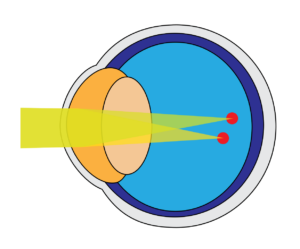
Warning Signs of a Wrong Eyeglass Prescription
Whether your vision has gradually changed for the worse as you age or you were born with less-than-perfect eyesight, if your eyes don’t quite see the way they should, you’ve likely been prescribed some corrective lenses. A new pair of glasses or contacts comes with the promise of much-improved vision, and thus much-improved quality of life. Unfortunately, however, this isn’t always the case. Too many people end up wearing the wrong eye prescription.
We put a lot of faith into our ophthalmologists and opticians, but the truth is that they’re only human. When taking our eye measurements and flipping through different lens options to find the correct prescription, they could very well make mistakes. It’s also important to consider how long eyeglass prescriptions are good for – about two years. If it’s been longer than that since you’ve visited the doctor, your vision may have changed more, resulting in a greater margin of error.
Human error is nothing to be ashamed of; we’ve all made our share of mistakes. In fact, our own human error could play a part in creating an inaccurate prescription when the ophthalmologist is asking us to choose between different lenses during the exam. As much as we would like getting corrective lenses to be an exact science, this just isn’t the case. If you’re wondering, “How do I know if my eyeglass prescription is wrong?”, you’ve come to the right place. Here are some signs of a bad eyeglasses prescription to look out for when your new lenses come in.
Headaches from Having the Wrong Prescription
Let’s say you bring home a snazzy pair of new frames, or your shipment of shiny new prescription contacts finally arrives. You excitedly put them on each morning for the next few days, only to be met with one of the most annoying bad eyeglass prescription symptoms: pain in your head. The new glasses headache is a telltale sign that something isn’t quite right.
If you’ve ever tried on a friend’s glasses and almost immediately experienced a headache or dizziness, you know how drastically the wrong prescription can impact your vision. However, your friend’s prescription is probably pretty different from yours – it’s likely their glasses are too strong. When you get a new prescription, the headaches won’t come on as quickly as when wearing someone else’s prescription. This is because it’s probably off by the slightest amount. Unfortunately, this amount is enough to give you headaches.
If you’re concerned that your new glasses or contacts cause headaches, here’s what you should do. First, keep track of when these headaches occur and how long they last. Take note of the activities you are doing when you experience the pain. Is it close work? Or when you are engaging your longer-range vision? The wrong prescription can cause your eyes to strain as they try to adapt to the lens they’re seeing through. When this happens, you’ll get frequent headaches while wearing the prescription. If you notice the headaches happen when you’re wearing your glasses or contact lenses, but suddenly disappear when you take them off, then you may need a different prescription.
However, if you’re prone to headaches with or without glasses, you can test your eyes by wearing your lenses at different times of the day. For example, wear them during a time when you know you normally don’t get headaches. If headaches show up at that time, you may need to head back to the eye doctor’s office for another evaluation. They should be able to help you with what to do if your eye prescription is wrong.
Vertigo
If you’ve ever thought to yourself, “My new glasses make me dizzy,” that’s another telltale sign that your prescription is off. No one likes to feel dizzy, but what if we told you that there’s an even worse form of dizziness you could experience when wearing the wrong prescription? Well, there is – it’s called vertigo. Vertigo is more than just dizziness. While you can alleviate dizziness by lying down and waiting for it to pass, vertigo is much more aggressive.
Vertigo is the sensation of dizziness or the feeling of being unbalanced while standing or sitting. It’s persistent and requires medical attention. While it’s often associated with inner ear problems, vertigo can also be caused by blurred vision. Currently, there’s no research that indicates the wrong prescription will cause vertigo, but it can certainly worsen the problem.
This is because vertigo is closely tied to depth perception. If depth perception is something you struggle with, corrective lenses should help. However, if you have the wrong prescription and you also have vertigo, it’s a recipe for disaster.
If you’ve been diagnosed with vertigo already and your symptoms get worse when you wear your glasses, speak to your doctor about correcting the lenses.
If you’ve never had vertigo before but suddenly experience the symptoms after receiving a new prescription, see your doctor. It’s imperative that you not only get your prescription fixed but also have your general physician evaluate your symptoms. Vertigo can cause or be caused by other serious health problems.
Blurred Vision
Finally, we come to the most disheartening sign of a wrong prescription: blurred vision. You leave the optician’s office excited to be able to make out street signs and small writing. But that dream soon falls flat when you realize that your vision is still fuzzy and blurry.
This isn’t always cause for alarm, though. Blurred vision after receiving a new prescription could also just be a sign of your eyes adjusting to the new lenses. If you experience blurred vision in the first few days, don’t be so quick to call up your eye doctor. Give your eyes some time to adjust. You can also try some natural remedies for blurry vision, like eating more eye-healthy foods or doing eye exercises.
Generally, if the blurred vision persists for longer than two weeks, then you should call your eye doctor to have them re-evaluate your prescription. If the blurry vision is accompanied by vertigo or headaches before the two weeks are up, contact your eye doctor right away. This is the best way you can prevent your symptoms from escalating.
Our eyes are very sensitive. Although they can adjust to change quite easily, if even the slightest thing is off, they will react. You need to monitor blurred vision because it will impact your vision and overall health if you don’t treat it.
I Think My Eye Prescription Is Wrong
Having the wrong prescription is like having one leg that’s shorter than the other. That small difference of a fraction of an inch will throw your whole body’s alignment off. The same goes for your eyes. The slightest miscalculation could cause blurred vision, headaches, and dizziness.
The best thing you can do if you suspect your prescription is off is to head back to your eye doctor. At the end of the day, it’s their job to help you see better, so they’ll make the necessary adjustments. Changes in prescription can be finicky, so work with your doctor to find the best solution for you.
If you want to do a little digging yourself first, familiarize yourself with your prescription. If you’re unsure how to read it, check out this helpful guide from the Cleveland Clinic. Knowing how to read an eye prescription and understand what the numbers and abbreviations mean can help prepare you for a conversation with your doctor.
Now, if you’re looking for a more permanent fix to your refractive error, consider training your eyes through at-home exercises or a vision therapy program. Vision therapy programs are tailored to your specific needs. They may even help you get rid of your bad eyeglass prescription permanently.
Don’t forget to eat a balanced diet. Make sure that your eyes are getting the vitamins and nutrients that they need! With all of this in mind, you’ll be well on your way to improving your blurred vision, regardless of your prescription lenses.
Our Rebuild Your Vision Ocu-Plus Formula Contains All 17 Vitamins, Minerals, and Herbal Supplements to Improve Your Eye Health!












Is there anything I can do if I was given the wrong prescription. Have been getting very pain headaches. Would appreciate any information.
On my last eye exam, it was determined by the doctor to change my prescription for stronger lenses.
I could not afford their price so opted to take the prescription else were and got an affordable price.
The new pair as I picked them up felt ok. but as days went by , I noticed light headache and walking out of balance.
I was ordered a Head CT scan by my family doctor in case something wrong was within my head, No problem found .
Went back with my new pair to the doctor who prescribed me first , even paid extra to get my lens checked, the eye examination revealed no changes from previous prescription provided couple wks before but found the centre of the lenses not matching my vision centre and to go back to the manufacturer to get the lenses done properly.Also the manufacturer of my new pair sent me to a private clinic cause it was found instead to have cataracts.( I am not affected in any ways neither 3 previous eye exams had revealed any such findings))
Here is when the dispute started between the two places ,each maintaining been right..
I have stop wearing the new pair now and back to my old pair, the motion out of balance, is gone away .
What help can I get to start enjoying a healthy relaxed life style again
It has been now over a month and can’t get any solution ,neither any help.
What are my options please ?
Thank you in advance.
Name withheld
Hi, I got my new eyeglass 3 days ago. I started to get headache and then I got fever. Is this a sign of wrong eyeglass prescription?
Why did you not mention optometrists in this article?
I am getting increasing spells of vertigo
6 months ago my right retina dropped and
was reset using gas bag and I had lost 50 per cent of my vision. I had glasses made
prior and was getting double vision out of
my right eye so a new prescription using
lens that eliminate double vision were made
My right eye has recovered 90 % of its
vision and when I put a magnifying glass in
front of the right eye reading is perfect
Doctor recommends cataract surgery
I think it is wrong prescription as my eye
has recovered
When doing the eye exercises you do not wear your glasses correct? If not however, I can’t see the dot or comma.
Cheryl
When you are doing your eye exercise you don’t need your glasses. You are not reading. You are moving your eyes – up and down- side to side- circles, squares.
Can you email me your instructions
how to excercise my eyes
I lost the sheets I printed